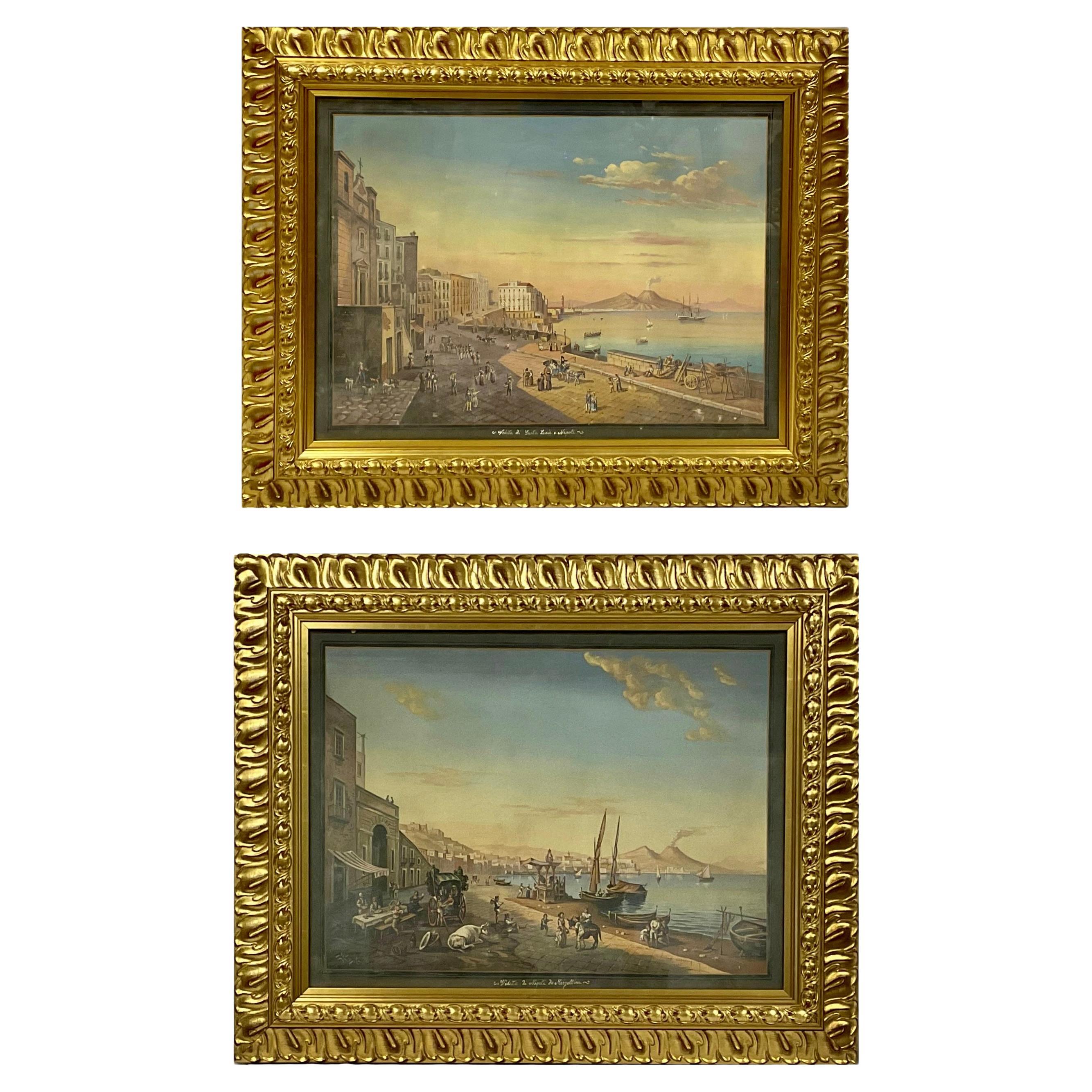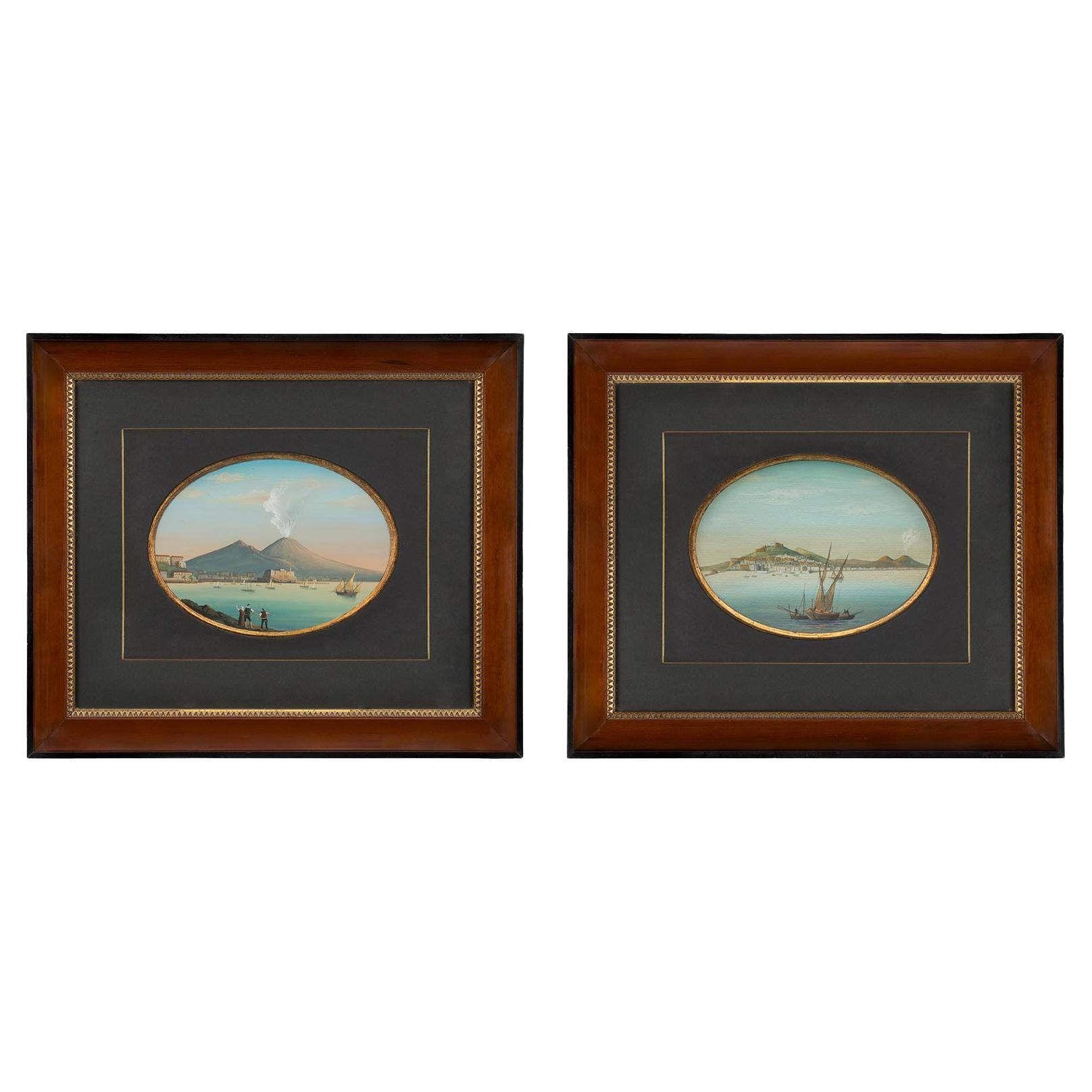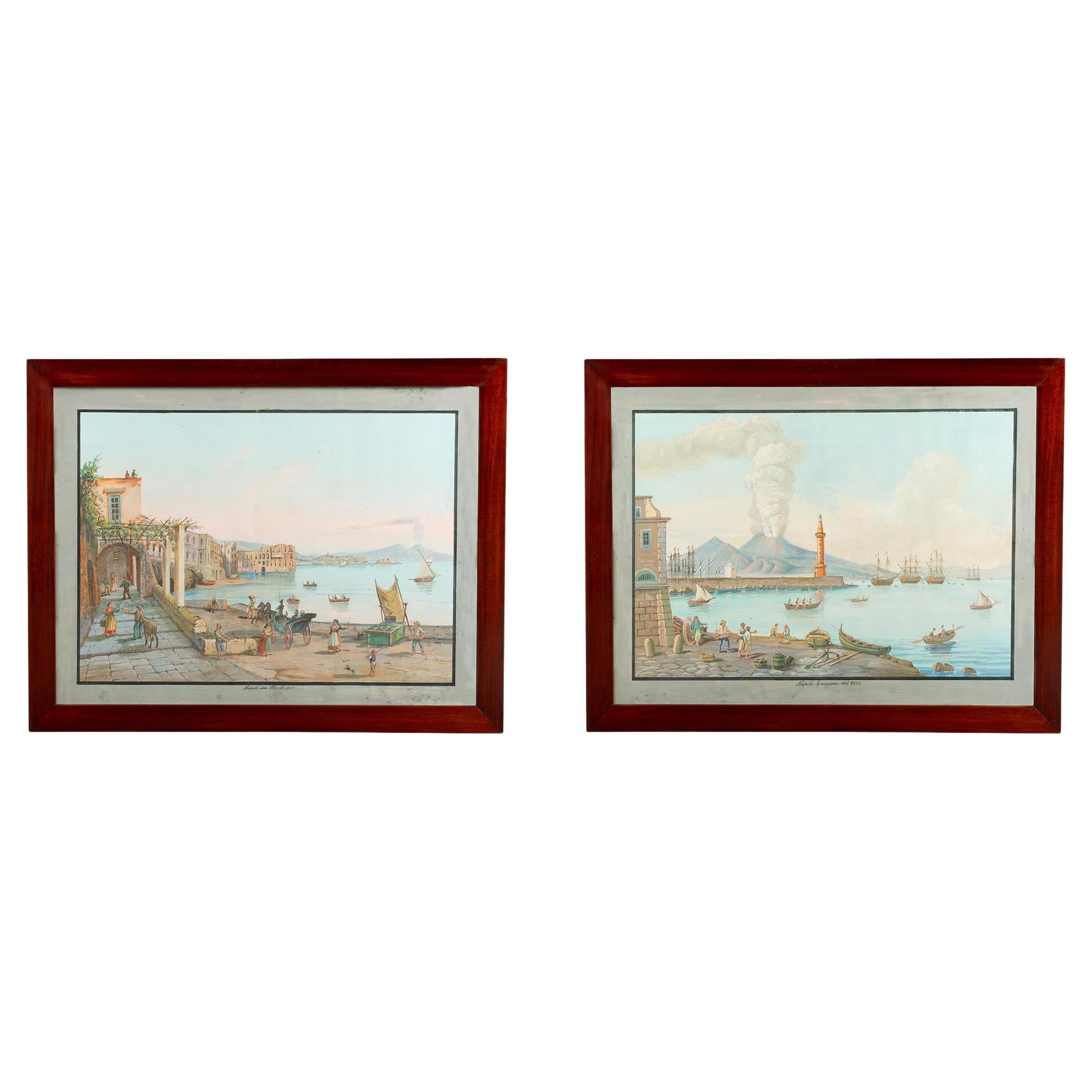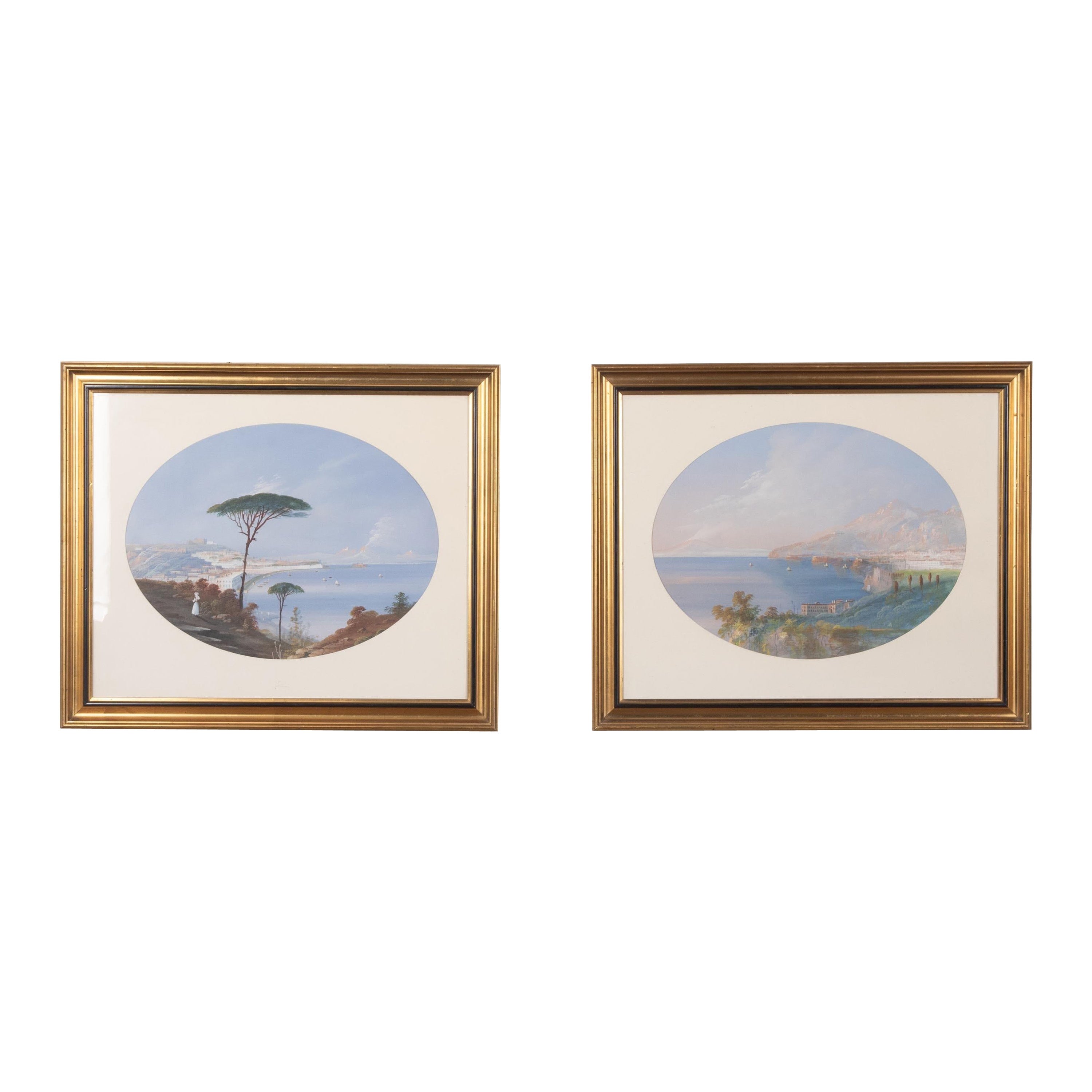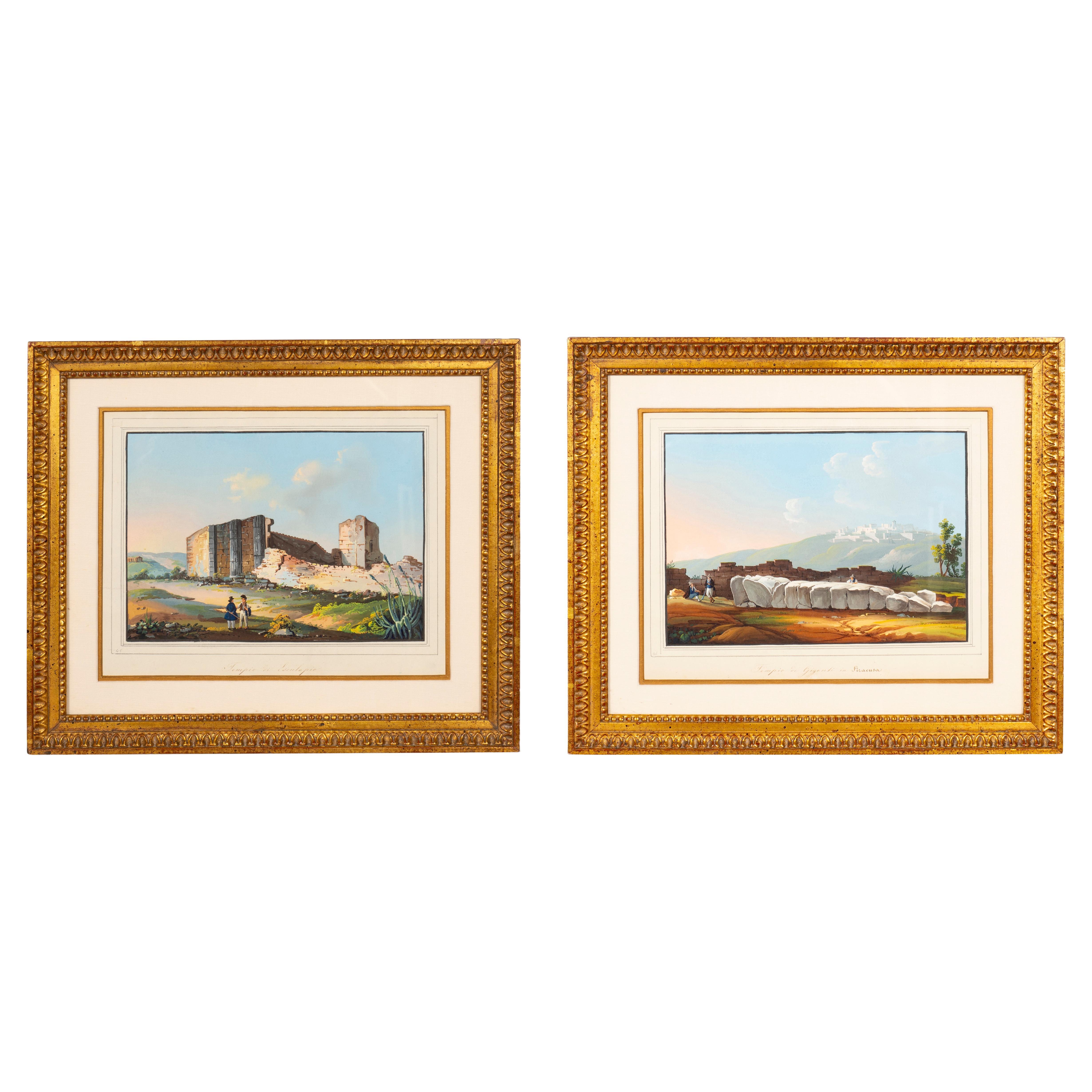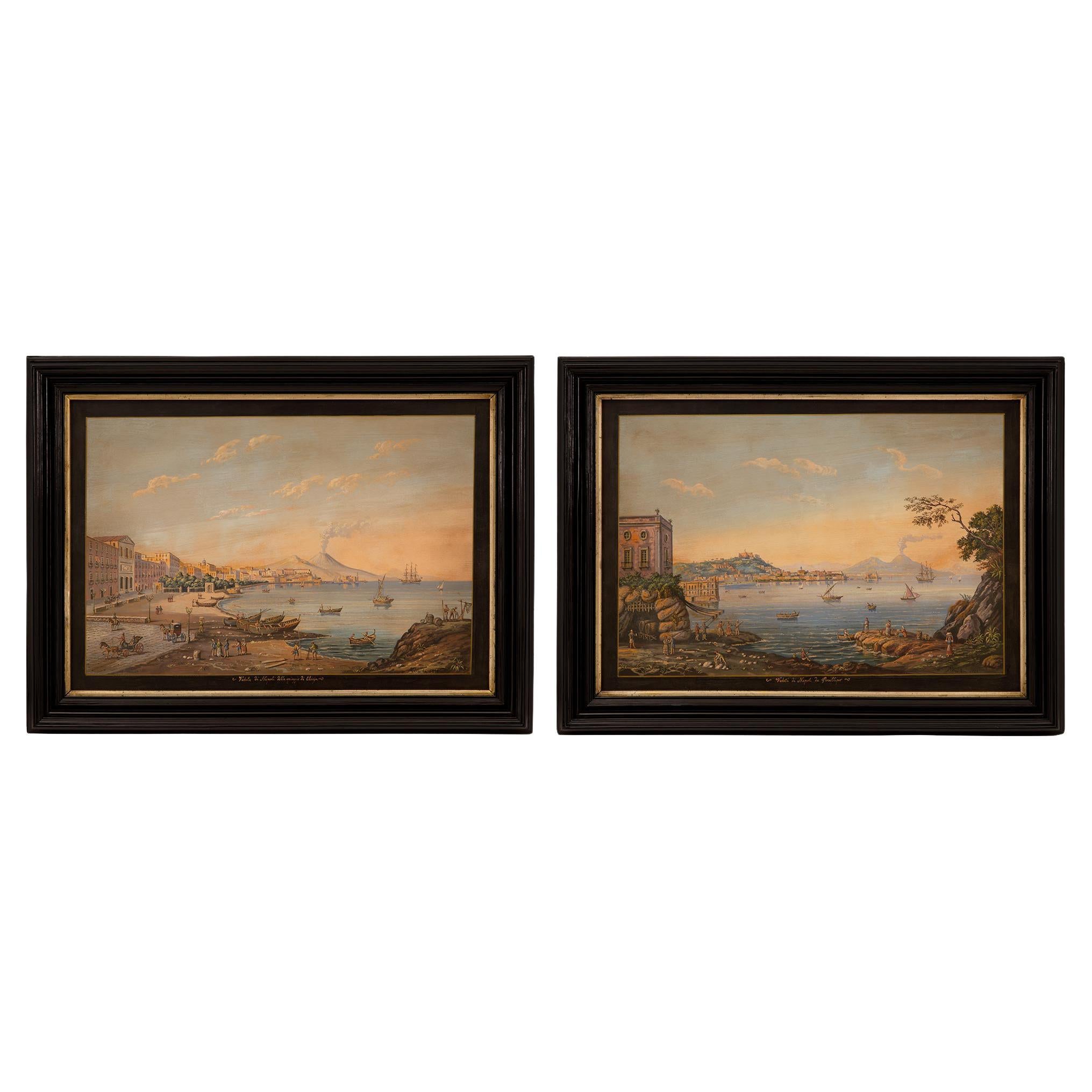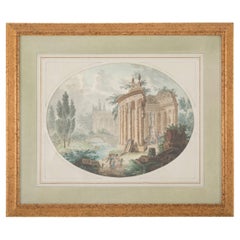Items Similar to Pair 18th or 19th Century Italian Grand Tour Gouaches Of Vesuvius, Bay of Naples
Video Loading
Want more images or videos?
Request additional images or videos from the seller
1 of 22
Pair 18th or 19th Century Italian Grand Tour Gouaches Of Vesuvius, Bay of Naples
$7,800
£5,918.46
€6,767.23
CA$10,894.48
A$12,113.19
CHF 6,324.84
MX$147,446.96
NOK 80,702.16
SEK 75,614.07
DKK 50,505.09
Shipping
Retrieving quote...The 1stDibs Promise:
Authenticity Guarantee,
Money-Back Guarantee,
24-Hour Cancellation
About the Item
Pair of 18th or 19th century Neapolitan gouaches of Virgil's Tomb, one with a view of Mount Vesuvius and the Bay of Naples. This is a wonderful high quality pair of a rare subject. At first I thought it is the front and reverse of Virgil Tomb, but each gouache is inscribed in pencil on the reverse "La Tomba di Virgilio" and "Sepolero di Campana" , which is a bit of a mystery.
One gouache has a large watermark, a Fleur-de-lis within a shield topped by a crown, likely a royal coat of arms. One is inscribed and signed, though I am unable to decipher. It could possibly be signed by Xavier della Gatta, active in Naples 1777-1829. The frames they came in were damaged beyond repair, I have had them re-matted.
Great examples of Italian Grand Tour gouaches.
21 by 16 matted
15 by 10 site
The tomb of Publius Vergilius Maro (70 BC – 19 BC), known to most simply as Virgil, the 1st century BC Roman poet who left the world the Ecologues, the Georgics and the Aenid and who is considered by some as one of the most important writers of all time.
That this Augustan era tomb doesn’t actually hold Virgil’s remains seems completely immaterial. That he wasn’t born here, totally inconsequential. The world renowned writer is a hometown hero, one of the guardians of the city.
And Virgil’s affection for Naples, his Partenope, was the same. It was his dying wish to be buried in the place he dearly loved.
"Mantua me genuit, Calabri rapuere, tenet nunc Parthenope; cecini pascua, rura, duces."
"Mantua gave me birth; Calabria took me away; and now Parthenope holds me: I sang of pastures, farms, leaders." Virgil’s Epitaph, 1st Century BCE
A place of immense natural beauty, a quiet spot at the foot of Posillipo hill overlooking Vesuvius and the Bay.
"…we climbed the cliff and stood upon the hill which will be ever memorial as the home of the poet Virgil. Here, with perhaps the loveliest view on earth outspread before him, he composed his two great works, the “Georgics” and “AEneid,” whose glory has outlived by many centuries the Roman Empire itself. The word Posillipo means “freedom from sorrow” and, apparently, the poet found the situation worthy of its name; for when he died at Brindisi, just nineteen years before the birth of Christ, he begged the Emperor Augustus, with whom he was then traveling, to see that his remains were brought back and buried on this hill." John L. Stoddard, John Lawson Stoddard (April 24, 1850 – June 5, 1931)
For over 2000 years, Virgil’s tomb has been a place of pilgrimage. A tradition that would come and go in fits and starts throughout the ages. In the first century AD it was said that the Roman poet Silius Italicus (c. 28 – 103 AD) owned Virgil’s tomb and dedicated himself to preserving the poet’s memory.
Not to be confused with the more well known Virgilian Park, this area clinging to the foot of the tuffaceous ridge of Posillipo is strangely little known, even by the Neapolitans. Yet, in the few hundred square meters of the small park of Piedigrotta, there is a lot of history.
First of all, the mausoleum-tomb of Virgil, to whom we owe the name, should be mentioned: the great poet lived for a long time in Naples, and in medieval times the population considered him the patron saint of the city, attributing to him magical powers and, among other things, the legend of the egg that gives its name to the Castel dell'Ovo. His tomb was therefore a real place of worship, even if there is no certainty that it is the poet's tomb. The mausoleum is located in an elevated position, at the mouth of the Neapolitan Crypt (which will be discussed later), and is called a columbarium, due to the numerous niches dug inside. A narrow staircase in the tuff allows you to reach it, despite the impervious position.
- Dimensions:Height: 10 in (25.4 cm)Width: 15.5 in (39.37 cm)Depth: 0.5 in (1.27 cm)
- Style:Grand Tour (Of the Period)
- Materials and Techniques:
- Place of Origin:
- Period:
- Date of Manufacture:Circa 1800
- Condition:One gouache has three pin holes in the sky, otherwise these are in remarkable condition, with the detail and vibrant colors well preserved.
- Seller Location:Stamford, CT
- Reference Number:1stDibs: LU803043180252
About the Seller
5.0
Platinum Seller
Premium sellers with a 4.7+ rating and 24-hour response times
Established in 1990
1stDibs seller since 2004
473 sales on 1stDibs
Typical response time: <1 hour
- ShippingRetrieving quote...Shipping from: Stamford, CT
- Return Policy
Authenticity Guarantee
In the unlikely event there’s an issue with an item’s authenticity, contact us within 1 year for a full refund. DetailsMoney-Back Guarantee
If your item is not as described, is damaged in transit, or does not arrive, contact us within 7 days for a full refund. Details24-Hour Cancellation
You have a 24-hour grace period in which to reconsider your purchase, with no questions asked.Vetted Professional Sellers
Our world-class sellers must adhere to strict standards for service and quality, maintaining the integrity of our listings.Price-Match Guarantee
If you find that a seller listed the same item for a lower price elsewhere, we’ll match it.Trusted Global Delivery
Our best-in-class carrier network provides specialized shipping options worldwide, including custom delivery.More From This Seller
View AllPair 18th Century Italian Hand Colored Engravings Roman Frescoes from Pompeii
Located in Stamford, CT
A pair of 18th century Italian hand colored renderings of frescoes in Pompeii in what became famous as the color "Pompeii Red". The detail is intricate and exquisite, and it is clea...
Category
Antique Late 18th Century Italian Neoclassical Decorative Art
Materials
Paper
18th Century Italian Neoclassical Watercolor with Roman Ruins
Located in Stamford, CT
18th century Italian capriccio depicting ruins based on the Roman Temple of Vesta being visited by a group of Grand Tour travelers. With an arched bridge and another columned structu...
Category
Antique Late 18th Century Italian Neoclassical Paintings
Materials
Paper
Pair 18th Century Hand Colored Engravings of Brussels by Frederic Leizel
Located in Stamford, CT
Pair of hand colored engravings of the Royal Palace and Brussels Park by Balthasar Friedrich Leizelt (also spelled Leizel, active 1750–1800) a German artist and copperplate engraver working from Augsburg. These are beautiful and evocative renderings of architecture, open space and perspective.
1- Place Royal A Bruxelles
2- Vue Du Parc A Bruxelles
22 inches wide 18 high
Leizelt produced a series of European and American scenic views at a time when pictures of foreign countries and people were popular and designed for use in optical viewers. As is normal for these prints the series title is a mirror image because optical viewers made use of mirrors which reversed the image. The Age of Enlightenment sparked a great interest in science, so that optical toys...
Category
Antique Late 18th Century German Neoclassical Prints
Materials
Paper
Pair 18th Century Framed Italian Etchings of Churches in Rome by Guiseppe Vasi
Located in Stamford, CT
Pair of 18th century Italian architectural etchings of churches in Rome by Guiseppe Vasi (1710-1782) from "Raccolta Delle Più Belle Veduta Antiche...
Category
Antique Mid-18th Century Italian Neoclassical Prints
Materials
Paper
18th Century Italian Hand Colored Engraving of Frescoes Excavated at Pompeii
Located in Stamford, CT
A meticulously detailed hand colored rendering of a fresco in Pompeii in what became famous as the color "Pompeii Red". The detail is intricate and exquisite, and it is clear the inf...
Category
Antique Early 19th Century Decorative Art
Materials
Paper
Pair of Italian Mid-Century Modern Reverse Glass Paintings of Royalty
Located in Stamford, CT
A pair of unusual and very intriguing large scale reverse glass paintings of a noble man and woman. She with her long neck and limbs, dressed in an elegant gown metallic copper gown...
Category
Mid-20th Century Italian Mid-Century Modern Decorative Art
Materials
Glass
You May Also Like
Pair of Italian 19th Century Neapolitan Gouaches
Located in Bradenton, FL
An absolutely exquisite pair of Italian 19th century Neapolitan gouaches in 20th century giltwood frames. One depicts the volcano eruption of 1822 in Naples, the other is an affluent...
Category
Antique 19th Century Italian Grand Tour Paintings
Materials
Paint
$4,440 Sale Price / set
40% Off
Pair of Italian 19th Century Gouaches Depicting Scenes of Naples, Italy
Located in West Palm Beach, FL
A wonderful pair of Italian 19th century gouaches depicting scenes of Naples, Italy. Each with exquisite and vibrant colors within ebony and mahogany frames with a gilt inner band. O...
Category
Antique 19th Century Italian Paintings
Materials
Wood
Pair of Italian 18th Century Neapolitan Gouaches in 19th Century Mahogany Frame
Located in West Palm Beach, FL
A beautiful pair of Italian 18th century Neapolitan gouaches in 19th century mahogany frames. One depicts the volcano eruption of 1822 in Naples, the other is an affluent residential...
Category
Antique 18th Century Italian Paintings
Materials
Canvas, Mahogany
Pair of 19th Century Gouches of Naples
Located in Shipston-On-Stour, GB
An early C19th pair of finely detailed gouaches, depicting unusual scenes of the bays of Naples and Sorrento. In charming light colours and excellent condition. Circa 1820.
H: 45 cm...
Category
Antique 1820s Italian Grand Tour Paintings
Materials
Paint
Two Italian Grand Tour Gouaches of Ancient Temples
Located in Essex, MA
In quality gilt wood frames one signed "Temple of Giganti in Siracusa the other Temple de Esculapio.
One a scene from Sicily and the other Roman. Temple Esculapio is a ruin of an ancient Roman temple of Asklepios, the Greek god of medical art.
Category
Antique 19th Century Paintings
Materials
Paper
Pair of Italian 19th Century Louis XVI Style Gouaches in Their Original Frames
Located in West Palm Beach, FL
A striking and most decorative pair of Italian 19th century Louis XVI st. gouaches in their original ebonized fruitwood and Mecca frames. Each gouache is framed within elegant eboniz...
Category
Antique 19th Century Italian Louis XVI Paintings
Materials
Canvas, Fruitwood
More Ways To Browse
Gouache Naples
Tomb Guardians
John Powers
Neapolitan Crown
Syrian Gold
Thomas Holland Sculpture
Vintage Bakelite Colors
Virginia Chest
Walnut Coffer
Wood Foo Dogs
Yellow Bed Frame
Yellow Campaign Furniture
18th Century Italian Marquetry Commode
19th Century Filing Cabinet
1930s French Rattan Furniture
1960s King Headboard
19th C Chinese Lacquered Cabinet
19th Century English Victorian Chest Of Drawers
